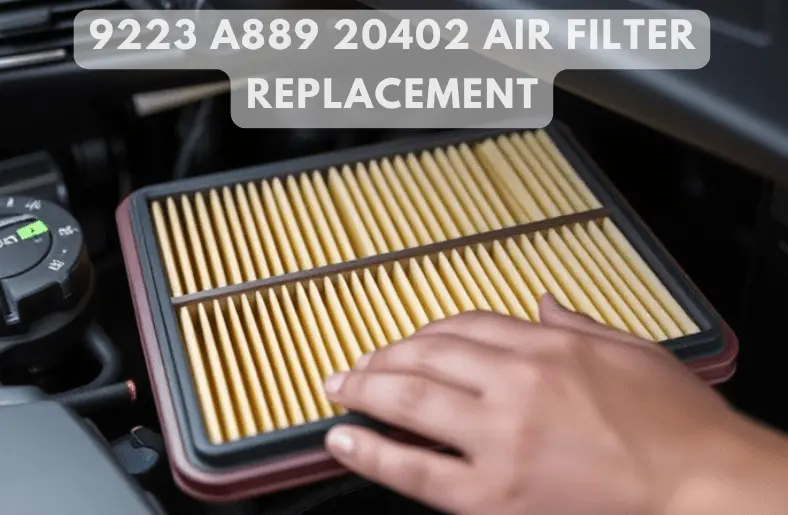When it comes to vehicle maintenance, small changes can make a big difference. One simple task, like replacing your air filter, can significantly impact your car’s performance. Over time, your engine’s air filter collects dust and debris, affecting fuel efficiency and overall smooth driving. Regularly replacing the 9223 A889 20402 air filter replacement ensures that your car runs efficiently, improving both engine health and your driving experience.
What Is the 9223 A889 20402 Air Filter?
The 9223 A889 20402 air filter replacement is a vital part of your car’s engine system. It guarantees that the engine gets clean air, which enables it to run as efficiently as possible. Over time, this filter traps dirt, dust, and debris, preventing them from damaging the engine. Without a proper filter, these contaminants can cause significant harm.
Additionally, the 9223 A889 20402 filter plays a role in maintaining fuel efficiency. By ensuring proper air intake, it helps your engine burn fuel more effectively. In turn, this reduces emissions and improves overall performance, making it essential for smooth driving and engine longevity.
Why Air Filter Replacement Matters
Air filter replacement is essential for maintaining your car’s performance. When the filter gets clogged, airflow to the engine is restricted. As a result, the engine struggles to perform efficiently. Regularly replacing the air filter ensures optimal air intake and engine function.
Moreover, a clean air filter improves fuel efficiency. It reduces strain on the engine, which saves fuel. Ultimately, a well-maintained air filter helps prevent costly engine repairs. Therefore, timely air filter replacement is crucial for smooth driving and long-term vehicle health.
How Often Should You Replace the 9223 A889 20402 Air Filter?
The 9223 A889 20402 air filter needs to be changed approximately every 12,000 to 15,000 miles. However, depending on the driving conditions, this could change. For instance, frequent driving in dusty areas may require more frequent replacements. Similarly, extreme weather conditions, like heavy rain or snow, can also affect filter lifespan.
It’s a good idea to check the filter at regular intervals, ideally with every oil change. If you notice a decrease in engine performance or increased fuel consumption, it may be time for a replacement. Regular maintenance ensures your vehicle operates at its best, improving efficiency and longevity.
Benefits of Regular Air Filter Replacement
- Improved Fuel Economy
The engine can burn fuel more effectively when the air filter is clean. As a result, it increases fuel economy by ensuring optimal air flow. This reduces the need for frequent refueling and cuts overall fuel costs. - Better Acceleration
Replacing the air filter improves engine performance. It enhances airflow to the engine, which allows for faster acceleration. This is especially important when overtaking or driving in challenging traffic conditions. - Reduced Engine Strain
Engine strain is reduced by a clean air filter. By ensuring proper airflow, it prevents the engine from working harder to function, reducing wear and tear. This leads to a longer engine lifespan and less frequent repairs. - Lower Maintenance Costs
You can save money on repairs by replacing your air filter on a regular basis. When the air filter is replaced on time, it helps prevent engine damage. This reduces the likelihood of costly engine repairs and improves overall vehicle efficiency. - Reduced Harmful Emissions
A clean air filter helps reduce the production of harmful emissions. By maintaining the proper air-to-fuel ratio, the engine operates more cleanly, releasing fewer pollutants into the environment. This makes your vehicle more eco-friendly. - Improved Air Quality
Improved cabin air quality is a result of changing the air filter. It helps trap dust, pollen, and other particles, keeping them from entering the vehicle’s interior. This leads to fresher, cleaner air inside your car.
Table Format
| Benefit | Explanation |
| Improved Fuel Economy | Improved airflow to the engine from a clean filter maximizes fuel combustion and lowers fuel consumption. |
| Better Acceleration | It enhances the engine’s response by improving airflow, making the vehicle more responsive and capable of faster acceleration. |
| Reduced Engine Strain | With a clean filter, the engine faces less resistance, avoiding unnecessary strain and preventing early wear and tear. |
| Lower Maintenance Costs | Timely replacement of the air filter prevents engine damage, reducing the frequency of costly repairs and extending the life of the vehicle. |
| Reduced Harmful Emissions | Clean filters contribute to fewer emissions by maintaining the engine’s proper air-to-fuel ratio, making it more environmentally friendly. |
| Improved Air Quality | The air filter traps harmful particles, improving the air quality inside your car and offering a healthier environment for passengers. |
How to Replace the 9223 A889 20402 Air Filter
Replacing the 9223 A889 20402 air filter is straightforward. Find the filter compartment beneath the hood first. Then, carefully open it to access the old filter. Remove the old air filter by pulling it out gently, making sure to avoid debris spillage. Next, inspect the compartment for dirt or dust and clean it if necessary.
Afterward, place the new 9223 A889 20402 air filter into the compartment. Ensure it fits securely and seals properly. Lastly, shut the compartment and check that it fits. Maintaining optimal engine performance and efficiency can be achieved by routinely changing your air filter.
Indications That the Air Filter Needs to Be Replaced
There are several indicators that your air filter needs to be changed. First, if you notice a decrease in engine performance, this can mean the air filter is clogged. Additionally, poor acceleration or a rough engine idle can also be a warning.
Another common sign is a decrease in fuel economy. The engine must work harder when airflow is restricted by a dirty air filter. Lastly, if your vehicle emits unusual smells, like a musty odor, the filter might be trapping moisture. Keeping an eye on these signs ensures your car remains in good working condition.
The Cost of Air Filter Replacement
The make and model of your car can affect how much it costs to replace your air filter. Generally, the cost of the filter itself falls between $20 and $60. Labor charges can add an additional $10 to $30 for installation.
However, the cost is minimal compared to the potential damage caused by neglecting the replacement. A clogged air filter can lead to reduced fuel efficiency and engine wear. In the long run, replacing the filter regularly saves you from higher repair costs and ensures your vehicle’s optimal performance.
Conclusion
In conclusion, replacing the 9223 A889 20402 air filter replacement is crucial for your vehicle’s health. Regular maintenance ensures better performance, fuel efficiency, and reduces engine strain. While the cost is minimal, the benefits are significant. Always check the air filter at regular intervals to avoid costly repairs. Keep your engine running smoothly and enjoy a longer-lasting, more efficient vehicle.



